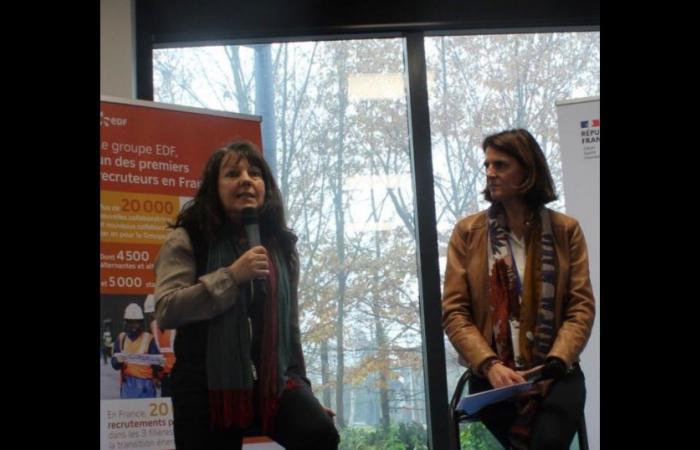The Ecological and Digital Transition Festival was born in 2021 in Dijon, from the initiative of a collective of partners from diverse backgrounds, mobilized to set up, through a varied program, an event with strong territorial resonance. Since 2022, new territories and local partners have joined the project: this year, the festival took place, from November 4 to December 8, in four population and employment areas: Dijon metropolis, Chalon-Le Creusot, Besançon -Dole-Mouchard and North Franche-Comté. In Dijon, the event took place on the campus of the Special School of Public Works (ESTP) and the Higher School of Electronics of the West (ESEO) with, as a highlight, 2 on December 4, the operation “Your job of tomorrow, sustainable and low carbon city”, a fun experience during which visitors were charged with a mission which led them to collaborate to identify and mobilize key skills in service of a project contributing to the decarbonization.
Within these courses, more than 60 professions were represented, ranging from CAP training to Bac+8, on the themes of housing, mobility, health and nutrition. “We had 5,000 participants last year, proof that this festival meets a need. Its objectives are simple: it is about raising awareness of the issues of ecological transition and presenting the professions linked to it in Burgundy-Franche-Comté. explains Laurence Mangenot, director of ESTP Dijon and president of the Campus des Métiers et des Qualifications (CQM) Green City. This Festival particularly targets “learners”: middle and high school students, students and apprentices. Often worried about the future of the planet, they are also faced with choices of direction. Training courses and professions in the ecological and digital transition offer opportunities for a professional future and thus means to act and give meaning to one’s profession. The forum is also aimed at people retraining and looking for work, teachers and employees.
On this question of employment, Carmen Munoz-Dormoy, regional action director of EDF Bourgogne-Franche-Comté, underlined the strong need for recruitment within 10 years of the energy company: “In the BFC, between 400 and 600 jobs per year will be filled, at all levels (20% professional baccalaureate, 50% technicians and 30% higher education graduates), to meet a dual challenge decarbonizing our economy and increasing the production of renewable energy. Recruitments are notably planned at the Belleville power plant, in the immediate vicinity of the Yonne department, or at Framatome, which plans to increase its production threefold, without counting on the development of the hydrogen sector in the region, a source of new professions ». For his part, Thomas Fraïoli, regional director of Enedis Bourgogne, mentions an increase in activity of 20% per year: “At this rate, it will be impossible for us to operate at constant staff numbers. We therefore anticipate more than 3,000 recruitments in the next three years at the national level, including around a hundred in the BFC”.
Jobs and future training
And to help with recruitment, two thematic clubs were created in BFC: the network schools club (led by Enedis) and the construction schools club (co-organized by the FRTP and the FFB, representing 1,100 companies and 11,000 jobs in BFC). “The idea is to make our professions known from second grade with specific modules which find their place at the heart of the teaching delivered at high school. This represents 30% of the subjects taught and 18 weeks of internship per year in our companies”. This year, four high schools have entered into contracts with Enedis (in Dijon, Montbard, Cosne-sur-Loire, and the BTS of the Gustave Eiffel technological high school). For the construction schools club, the objective is the same, with a recruitment need for the sector estimated at 550 annual positions according to Jérôme Caramelle, secretary general of the French building federation, and Claire Paris, general secretary of the federation regional public works.
Also read
Epona on the path to success
In this context, training stakeholders are mobilizing to “preparing the skills of tomorrow likely to meet the challenges of ecological transition”, says Marie Agnès Garnier, assistant to the Regional Academic Delegation for Initial and Continuing Professional Training (DRAFPIC). “We need to develop the attractiveness of professions in this sector, create bridges, detect the professions of tomorrow which will have an ecological dimension, direct candidates towards these professions and help companies recruit…”, supports Michel Swieton, director of France Travail BFC. “While waiting for these new training courses and their batches of new graduates, it will also be necessary to transfer existing professions to gain speed, to act immediately, faster than the initial training which will take between ten and 20 years”, argues Jean-Patrick Masson, vice-president of Dijon Métropole in charge of ecological transition.






